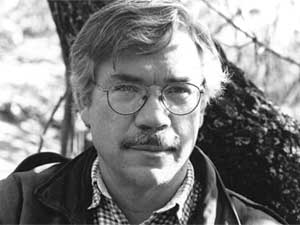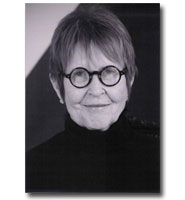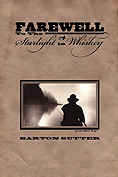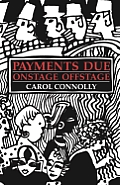Duelling Poets: Minnesota’s Laureates
To help mark Poetry Month, Cheryl Reitan sat down with Minnesotas two civic laureates: Barton Sutter from Duluth and Carol Connolly from Saint Paul. Whats the state of poetry in the state?




Minnesota’s two poet laureates, Barton Sutter from Duluth and Carol Connolly from St. Paul, are clearly tickled to be tossed together. Sutter calls Connolly, “one feisty gal,” and Connolly says Sutter is “smart and honest.” Their work has some similarities; each tackles questions — even those on politics, relationships, and children — with directness and unflagging honesty. Sutter and Connolly are both new to the role. This month marks Sutter’s first anniversary and Connolly was named St. Paul Poet Laureate in June 2006.
Reitan: Why was Duluth the first city in Minnesota to name a poet laureate?
Sutter: That’s easy. The people of Duluth are smarter, more soulful, and more ornery than other residents of the state.
Reitan: Why did St. Paul name a poet laureate?
Connor: Someone suggested to Mayor Chris Coleman that St. Paul should have a poet laureate and he said, “Done!” Someone suggested my name for the position and he said, “Done!”
Reitan: What is your main goal as the first Duluth Poet Laureate?
Sutter: To expand the adult audience for poetry, to draw attention to the remarkable poetry that’s being written right here, to recognize that we can be recognized for something besides taconite shipping and hockey. My friend Jim Johnson says (in a very loud voice) that Duluth is the Poetry Capital of the United States of America. I haven’t noticed any other city rushing to claim that title, so I think we might as well.
Reitan: What is your main goal as the first St. Paul Poet Laureate?
Connolly: To continue to promote poetry to readers and writers, and to allow as many people as possible access to poetry. Poetry deserves every bit of pomp and circumstance and attention it can get. It’s an art, which makes the reader a wiser and stronger person.
Reitan: What are your official duties?
Connolly: I continue to present poets reading their work, each month, as I have for eight years. I’ve also accepted a charge by the Mayor to write occasional poems. The first was for the budget address in August 2006, and it received quite a bit of attention. USA Today included these lines from the poem in a piece about Boston’s poet laureate debate: “We know what we do now reverberates forward through time and space/and with every ounce of our talent exercised, we step up to the plate.”
Sutter: I plan three public events in the Duluth area each year, keeping in mind the Duluth Poet Laureate position is the community’s way of honoring area poets and encouraging the enjoyment of poetry. I don’t write commissioned pieces.
Reitan: Who’s your favorite poet?
Sutter: Anonymous, author of the old folk ballads.
Connolly: My favorites seem to be the last people I’ve hosted in my reading series. I go back to old favorites often, like Mary Oliver, whose work helped me through a huge trauma in my life.
Reitan: Who’s exerted the strongest influence on your own poetry?
Connolly: Meridel LeSeuer believed in me immediately. She and her daughter founded a publishing company and my work was the first thing they published.
Sutter: The northern landscape, its critters, plants, and people. My maternal grandmother, who was an enthusiastic gossip and storyteller all of her very long life; my father, who was a fine reader-aloud and had a deep appreciation for quirky characters; my brother, who sings the old, anonymous ballads. Plus, of course, about 500 authors, living and dead.
Reitan: Tell us about your work.
Sutter: Probably the most distinctive aspect of my work is my use of traditional forms, the ancient patterns of rhythm and rhyme, about half the time. I write free verse, too, but contemporary poems in traditional forms are fairly scarce.
Connolly: I began writing poetry in 1976 by accident, when the fiction class I wanted to take at the Loft was full. I signed up for a poetry class instead. I have eight children and at the time I kept a therapeutic journal. My early work came from the lines I saved in my journal. It’s personal, but it is also about the experiences of other women.
Reitan: What’s the funniest moment in your career as a poet?
Sutter: Years ago, coming off a portage on a solo trip way back in the Boundary Waters, I ran into a group of young guys, whose leader said, “Are you alone? You must be a poet.”
Connolly: I have two stories to tell you:
After a reading in New York City for my first book of poetry, Payments Due, a man came up to me. He was very upset. He said, “I hate your poetry. I hate your work. I want to buy ten books.”
Payments Due was made into a play and after a performance I overheard one of the people involved in the production say, “God, she’s an angry woman.” Later, I wrote a poem for him. He was excited about the poem, until I recited it. It’s called “Ode.” Here it is in its entirety, “I am not / an angry woman /fuck you.”
Reitan: What’s the poetry scene like in Duluth these days?
Sutter: There’s a sort of slow-mo poetry explosion in this town, and it’s been going on for at least five years. I’d guess there’s as much poetry happening here as in any city this size in all of the Midwest, maybe in the entire country. There’s a reading series at all three colleges, plus many more in the wider community—from coffeehouses to people’s basements. People turn out in the hundreds for some of these. We’ve got poetry publishers, workshops, and collaborations with musicians and visual artists, you name it. There’s a wide range of work being written, and the best poets are extremely good—from old-timers like Louis Jenkins, Jim Johnson, and Connie Wanek to young-timers like Nathan Melis, Ryan Vine, and Jill Woerle.
Reitan: What’s the poetry scene like in the Twin Cities these days?
Connolly: It’s thriving. There are more readings at bookstores and other venues than ever. Traditional work and new forms have good audiences. Slams are very popular. I’m a fan of Slam Poetry because it’s opinion-based and that’s the kind of work I like. I even competed in a Slam once and got to the final round.
Reitan: Why do so many people prefer reading novels to poetry?
Sutter: I wonder why people read a novel of 500 pages to be moved to tears on the last page when a poem can get you there in 14 lines.
Connolly: As I mentioned, Bart is so smart.
Reitan: Is the audience for poetry any different elsewhere?
Sutter: Absolutely. In Russia, they’ll fill a soccer stadium to hear poetry. In a Swedish city, you’ll be standing on a corner, waiting for the light to change, look down, and see lines from a famous poem cemented in the sidewalk. The respect, affection, and hunger for poetry run deeper in Europe than here, maybe because more people have died there. Poetry is what humans have to say in the face of death. Just look at how often it’s read, even here, at funerals.
Reitan: Do you have encouragement for beginning writers?
Connolly: Write every day, if you possibly can. William Stafford said, “Poetry is talk with some luck in it. You just invite yourself to be lucky when you talk or write…” I tell beginners to keep writing and don’t worry about the end product. Kenneth Koch said “When you finish a poem, it clicks shut like the top of a jewel box.” The wonderful thing about poetry is that you know when the poem is done.
About Barton Sutter
A group of community organizations, spearheaded by Lake Superior Writers, named Barton Sutter the first Duluth Poet Laureate in April, 2006. He is serving a two-year term. Sutter won three Minnesota Book awards for Cold Comfort: Life at the Top of the Map, The Book of Names: New and Selected Poems, and My Father’s War and Other Stories. Sutter teaches English and creative writing at the University of Wisconsin-Superior and was the unanimous choice for Poet Laureate. His most recent book of poetry is Farewell to the Starlight in Whiskey.
Duluth Poet Laureate Events
Each year, Lake Superior Writers sponsors dozens of events including writing groups, workshops, readings and special Poet Laureate events.
The April Poet Laureate event, planned by Sutter, is “Duluth Outloud: A Sense of Place,” to be held on Saturday, April 28, at 7 pm, at LaFayette Community Center, on the shore of Lake Superior, 3026 Minnesota Avenue, Duluth. This poetry reading will celebrate Duluth and the surrounding region and will feature 12 poets, including Cal Benson, Gary Boelhower, Deborah Cooper, Jean Alice Jacobson, Jim Johnson, Paul Lundgren, Liz Minette, Sheila Packa, Ellie Schoenfeld, Bart Sutter, Ryan Vine, and Connie Wanek. The reading is free and open to the public; refreshments will be served. For more, see the Lake Superior Writers website or call 218-722-3094 or 218-724-1653.
About Carol Connolly
St. Paul Mayor Chris Coleman named Carol Connolly the first St. Paul Poet Laureate in June 2006. Connolly is the author of Payments Due, a collection of poems that has been adapted into a stage play in Los Angeles and Minneapolis. Connolly also has worked as a writer for the St. Paul Pioneer Press and the Star Tribune. She also is a former chairwoman of the St. Paul Human Rights Commission, has served on the Minnesota Racing Commission, and is a founder of the Minnesota Women’s Political Caucus. She is a regular columnist for Law and Politics Minnesota. In conjunction with Intermedia Arts/SASE, Carol runs monthly readings at the University Club.
St. Paul Poet Laureate Events
The Intermedia Arts/SASE Carol Connolly Reading Series is an ongoing series of public literary readings across the Twin Cities. Each year more than 300 writers and poets perform in a dozen different venues. For eight years, Connolly has hosted a monthly poetry event, most recently held at the University Club of St. Paul. Her April event is “Readings by Writers: a Poetry Month Celebration!,” Tuesday, April 17, 2007, 7:30 pm at the historic University Club of St Paul, 420 Summit Ave, St Paul. The event features Dave Crady, Evelyn Klein, David Kopf, and Tom Reed. Make reservations for the 5 pm optional dinner by calling 651-222-1751. For more, see the University Club website and the Intermedia Arts website.
And Now Some Poems . . .
Oprah Winfrey read “Romance” from Carol Connolly’s book Payments Due, on her television show.
Romance
In every romance
there is a time, early,
when I want to consume him,
own him,
lock him in a closet in my vicinity.
A closet with a window.
I am not a killer.
I want to put him in a box,
carry him with me,
and if he, without looking,
steps into the box,
I close the cover quickly,
bang it shut,
and hang it with a heavy padlock.
As I turn the key in the lock,
I look at him curled in the box
and think,
“You idiot. What are you doing in that box?”
“The Necklace” is from Barton Sutter’s book Farewell to the Starlight in Whiskey.
The Necklace
Ten tough years, and you are still
The one I want, despite your steel
Backbone, anxiety attacks, the lunatic hysteria
You carry in your blood like a dose of malaria.
I’ve heard you murmur odd thoughts about God
And sob as you shoveled a grave for your dog.
I’ve seen you drive tractor, drag a bush-hog,
And hunt for lady-slippers in a quaking bog.
You can build a wooden fence and glaze a window.
I’m glad to have a wife who threads her own minnow.
The other night as you fried fresh walleyes,
I was way too shy to do what I felt,
But I wanted to kiss that necklace of welts
Where you’d been bitten bloody by fierce black flies.